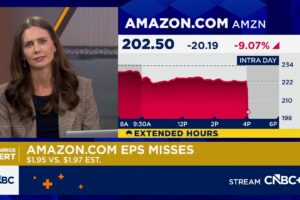
U.S. Treasury yields came sharply off their highs on Wednesday after Federal Reserve Chairman Jerome Powell’s remarks in his semi-annual testimony to Congress spurred bets that the U.S. central bank would go forward with interest rate cuts in July.
What are Treasurys doing?
The 2-year Treasury note rate TMUBMUSD02Y, -4.65% , sensitive to shifting expectations for Fed policy, plunged 7.9 basis points to 1.825%, marking its biggest daily decline in three weeks. The 10-year Treasury note yield TMUBMUSD10Y, -0.46% was mostly unchanged at 2.061%, near its highest closing level in four weeks, while the 30-year bond yield TMUBMUSD30Y, +1.16% was up 3.8 basis points to 2.571%, a three-week high.
What’s driving Treasurys?
Bond yields retreated from their highs after Powell underlined the worrisome global economic growth backdrop in front of Congress, setting the stage for lower interest rates when U.S. data has yet to point to an imminent recession. He said the Fed would act appropriately to lengthen the expansion and that the risks around trade tensions had continued to weigh on the outlook since the Fed’s June meeting.
See: Powell says uncertainties ‘continue to weigh’ on U.S. economic outlook and Fed stands ready to act
Powell’s dovish comments led traders to raise the chance of a 50 basis point rate-cut at the end of this month, based on fed fund futures data.
The Fed minutes from the June meeting helped to entrench rate-cut convictions. Several officials said they were in favor of a rate-cut if uncertainties persisted, clouding the U.S.’s economic prospects.
By contrast European bond-markets sold off after French industrial production surged 2.1% in May, its biggest monthly jump since Nov. 2016. The factory data helped allay concerns that global trade tensions was stalling the eurozone economy’s momentum.
The German 10-year government bond yield TMBMKDE-10Y, +13.82% picked up 5.2 basis points to negative 0.31%, while the French 10-year bond yield TMBMKFR-10Y, +73.02% rose 4.1 basis points to negative 0.02%, Tradeweb data show.
Read: Minutes of Fed’s June meeting bolster sense of imminent interest-rate cut
What did market participants’ say?
“My sense is that Powell is more concerned about global financial conditions (weak global PMIs, low global inflation, weakening growth everywhere) than he is pacified by a strong U.S. labor market,” wrote Jim Caron, managing director of global fixed income at Morgan Stanley Investment Management.
“We need to appreciate that the Fed is increasingly thinking outside the US toward global financial conditions in order for us to understand the Fed’s reaction function better,” said Caron.







